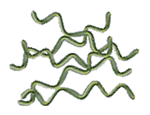
Spirulina
Introduction
This fact sheet provides basic information about Spirulina. Spirulina is considered nontoxic to humans at usual levels of consumption; however, information is limited. Spirulina, a type of blue-green algae (cyanophytes/cyanobacteria), takes the form of microscopic, corkscrew-shaped filaments and is now classified as a distinct genus, with A. plantensis found in Africa and Asia and A. maxima found in Central America. Free growing, spirulina lives in high-salt alkaline water in subtropical and tropical areas, sometimes imparting a dark-green color to bodies of water. Spirulina is noted for its characteristic behavior in carbonated water and energetic growth in laboratory cultures. It is commercially grown in the United States and has been proposed as the primary foodstuff to be cultivated during long-term space missions because it withstands extreme conditions.Spirulina has been described in literature since the 16th century. Spanish explorers observed the Aztecs harvesting a blue mud that probably consisted of spirulina. The mud, which was dried to form chips or cheese-flavored loaves, was obtained from Lake Texcoco in Mexico. Spirulina was similarly harvested in the Sahara Desert where it was called dihe. Thus, two cultures approximately 10,000 km apart, independently discovered and utilized the nutritional properties of spirulina.
Common Names
Spirulina, Dihe, TecuitlatlLatin Names
Arthrospira platensisWhat It Is Used For
- Spirulina is sold in the United States as a health food or supplement. Diverse claims exist for its immunostimulatory, hypolipidemic, antiviral, and anticancer effects; however, there is limited evidence to support these indications.
How It Is Used
Spirulina is available in tablets and powder.What the Science Says
- Clinical trials have investigated spirulina's potential but have failed to indicate any consistent effects.
Side Effects and Cautions
- Information regarding safety and efficacy in pregnancy and lactation is lacking. Spirulina may contain more than 180 mcg of mercury per 20 g of spirulina and should be avoided.
Sources
- Drugs.Com Web site. Accessed on February 7, 2009.
- From Wikipedia, the free encyclopedia. Accessed on February 7, 2009.






